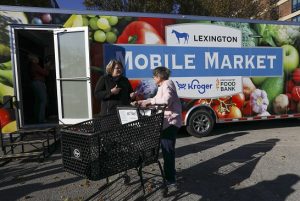2024 All-America City – Lexington, KY

Mobile Market ribbon cutting Nov. 30, 2023.
Photo by Amy Wallot
Lexington, Kentucky, a city of over 320,000, is one of the state’s primary economic engines. As the “horse capital of the world,” and home to the “finest farmland the commonwealth has to offer,” Lexington is leading the way for a vastly growing agriculture industry, balancing both rural and urban needs with a booming economy, low cost of living, and high quality of life.
Like many cities, Lexington has seen its share of challenges. In 2020, Lexington was one of many cities across the country that experienced racial unrest. Demonstrations remained peaceful, as community leaders listened to those expressing concerns, leading to Lexington’s establishment of the Mayor’s Commission for Racial Justice and Equality.
Each day, the city is committed to setting new goals and building on past progress. To best meet residents’ needs, the city government is reaching out with new technology, and through new community partners.
Addressing Systemic Racism
In response to racial and social justice unrest, the Mayor’s Commission for Racial Justice and Equality was formed in Lexington in June 2020. Comprised of a diverse set of community members, the commission aimed to dismantle systemic racism through the work of five subcommittees: Education & Economic Opportunity; Housing & Gentrification; Health Disparities; Law Enforcement, Justice, & Accountability; and Racial Equity. The commission issued 54 recommendations in their report to address racial disparities, and the city has implemented many of them.
Additionally, the Clean Slate Lexington Expungement Clinic and Job Fair initiative aims to dismantle barriers, combat stereotypes, and foster a more inclusive society, offering services to expunge past non-violent criminal convictions, thereby removing obstacles to gainful employment. Since its inception, the initiative has provided assistance to over a thousand Lexington residents, enabling them to clear their records and regain access to education, jobs, housing, and voting rights. By partnering with fair-chance employers, the initiative not only enhances individuals’ employability and quality of life but also addresses employment gaps and contributes to the community’s tax base.
Lexington is home to many small communities that were developed by freed black people just before and after Emancipation. Known as hamlets, these were places where schools, churches, cemeteries, and grocery stores were developed and built. Hamlets were places where community was formed, and in many cases continues today.
The city hosts a campaign called “A Sense of Place” to celebrate Lexington’s historic hamlets, recognizing their contributions to the city’s history. Efforts include restoring landmarks like the Rosenwald School and preserving the rich history of these communities before they fade away.
CivicLex
CivicLex, a pioneering nonprofit organization, dedicates itself to enhancing civic engagement and community cohesion across five key areas: civic education, local news & reporting, improving public spaces, fostering relationships, and transforming civic participation.
In promoting civic education, CivicLex partners with schools to conduct workshops on city budgeting and local government operations. It also leads teacher externship programs aligning with city agencies, alongside hosting civic expos to connect students, community groups, and local government.
CivicLex’s news staff comprehensively covers all local government meetings, providing free reporting distributed widely online, through newsletters, and in collaboration with local media outlets.
Collaborating with stakeholders, CivicLex engages residents in shaping public spaces, exemplified by the Imagine New Circle Road project. This initiative garnered resident perspectives, leading to securing a federal grant for critical safety improvements.
Furthering community cohesion, CivicLex organizes inclusive events such as pancake breakfasts and crafting gatherings, fostering connections across diverse backgrounds and facilitating interactions with city staff.
CivicLex also collaborates with civic institutions to pioneer innovative governance models. This includes embedding artists in local government for improved communication, facilitating marginalized communities’ engagement in greenspace policy, and enhancing Lexington’s Urban County Council meetings and public comment processes through digital engagement tools and streamlined procedures.
Blue Grass Community Foundation
The Blue Grass Community Foundation (BGCF) is a cornerstone of Lexington’s democratic ecosystem, leveraging philanthropy to address pressing challenges through collaboration with residents, nonprofits, funders, and government. BGCF’s stewardship of the Reimagining the Civic Commons network underscores its leadership in transforming public spaces to foster community cohesion and belonging.
A standout initiative is BGCF’s involvement in the (Re)Imagining Cheapside project, which addresses historical racial injustices. This grassroots-led effort aims to build inclusion and healing on the site of a former slave auction adjacent to the Historic Lexington Courthouse. BGCF’s support for placemaking and community engagement endeavors, centered on Black leadership, has catalyzed the Lexington Black Prosperity Initiative (LBPI). This locally-led funding initiative, 100% Black-led, focuses on strengthening Lexington’s Black community by addressing long-standing issues resulting from deliberate underinvestment.
Additionally, BGCF is committed to nurturing the next generation of civic leaders and philanthropists through initiatives like BGCF365. Participants, with ages in their 20’s to 40’s, contribute one dollar per day to a collective fund supporting city needs. This self-governing initiative provides educational events and networking opportunities, empowering young contributors to shape Lexington’s future. BGCF’s holistic approach underscores its dedication to inclusive community development and leadership cultivation.
Some Related Posts
Thank You to Our Key Partners



